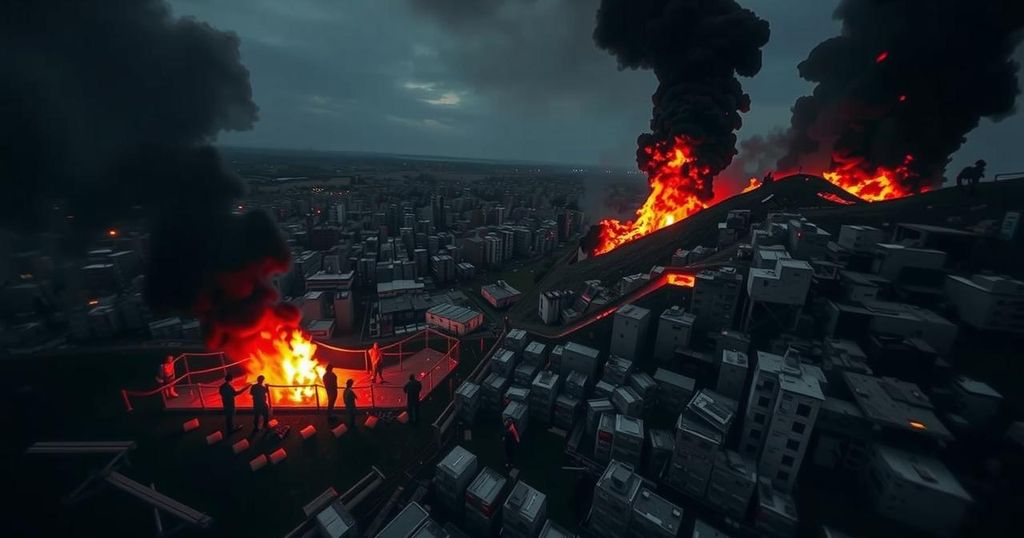Israeli military attacks on Lebanon have triggered deep-seated trauma among Lebanese Australians, many of whom have family ties to Lebanon. The violence has rekindled memories of the Lebanese Civil War and previous conflicts, while social media amplifies the emotional toll within the community. With an increase in Islamophobia and public protests, the situation also reflects broader societal tensions. The Australian government is facilitating evacuations and providing humanitarian assistance amidst the ongoing crises.
The recent military attacks by Israel on Lebanon have triggered haunting memories of past conflicts among the Lebanese community in Australia, particularly in regions such as Sydney and Melbourne, where their presence is significant. Michael Kheirallah, the chairman of the Victorian Lebanese Community Council, noted that the vast majority of Lebanese Australians maintain ties to family members in Lebanon, which compels them to stay updated through various news channels. This ongoing violence has led many community members to experience heightened levels of trauma and anxiety reminiscent of the Lebanese Civil War, which lasted from 1975 to 1990 and led to widespread devastation in Lebanon. The emotional impact is compounded by the pervasive dissemination of distressing imagery via social media, intensifying the community’s grief and concern. Those of Lebanese descent in Australia have made substantial contributions to society, with a large population offering cultural diversity through cuisine and traditions. Despite historical struggles, including the 2006 Israel-Hezbollah war, the Lebanese community has persistently maintained a strong collective identity, uniting amidst these challenging times. The government has initiated evacuation flights for around 3,400 Australian citizens and families currently in Lebanon, reflecting the urgency of the situation. Moreover, incidents of Islamophobia have spiked amid these tensions, leading to serious concerns within Muslim communities in Australia, which encompass a variety of cultural backgrounds, including those from Lebanon. Protests for Palestinian solidarity have taken place in Australia, with increasing concerns regarding violence in both Gaza and Lebanon. The demonstrations have at times included controversial symbols that have drawn scrutiny from authorities, leading to discussions about civil liberties and expressions of political dissent. The Australian government’s financial contributions towards humanitarian aid and public calls for ceasefires underline its commitment to addressing the crises that affect civilians in these conflict zones. Overall, the continuing violence evokes a painful nostalgia for many Lebanese Australians and raises critical questions about community resilience amid international challenges, as they hope for a swift resolution to the conflict.
The article discusses the significant impact of Israel’s latest military actions against Lebanon on the Lebanese Australian community, highlighting their historical connection to Lebanon and experiences of war. The Lebanese Civil War led to mass immigration, and many families still have relatives in Lebanon, which exacerbates their sense of anxiety during current conflicts. The backdrop includes the complex history of Lebanese migration to Australia, the rise of Islamophobia, and the societal contributions of Lebanese Australians. Additionally, it addresses the ongoing pro-Palestinian protests and the Australian government’s role in providing humanitarian assistance and evacuation support. The Lebanese community in Australia, composed of Christians and Muslims, has seen a rise in Islamophobic incidents in the wake of escalating violence, contributing to persistent challenges in community relations. The discussion about the government’s stance on Israel, including financial aid and military exports, indicates the nuanced dynamics at play in Australian foreign policy, which has implications for social cohesion and electoral politics in the country.
The article encapsulates the deep emotional resonance of the recent Israeli attacks on Lebanon for Lebanese Australians, who grapple with the trauma of past conflicts while striving to maintain their cultural identity in a new homeland. As the community unites in solidarity, their grievances are amplified by concurrent health and safety concerns, including a rise in Islamophobia. The Australian government’s interventions highlight both the humanitarian needs of those affected in Lebanon and the societal impact of such geopolitical developments on migrating communities. For many, a ceasefire represents hope for peace and stability—not only for Lebanon but also for their connections to family and heritage.
Original Source: www.aljazeera.com







